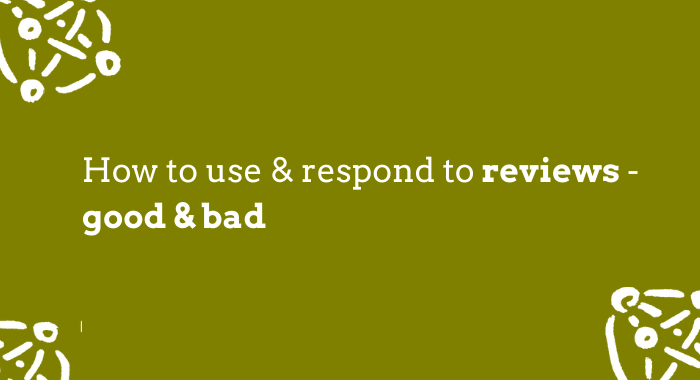Using and responding to reviews

I’ve spoken to many tourism business owners who feel really demoralised when this happens. It’s so easy to focus on one bad review, even when all your others are excellent.
It’s even worse when the reviewer is being dishonest or unreasonable. So, what can you do?
Everyone has off-days and it’s unrealistic to believe you can please everyone all the time. Sometimes bad reviews are nothing to do with what you’ve done, but more to do with how the reviewer was feeling at the time and what’s happening in their life. Think about it - if you go out for a meal with a partner in a bad mood, you’re far less likely to think the meal was good. You might be readier to find fault, because that’s how you’re feeling. As a business owner, you have little control over the attitudes of others.
But don’t get too demoralised – the odd bad review can actually be good for business! Really? Yes!
Let’s look at why people like reviews and how they use them.
Visitors like to use reviews as additional reassurance that they are making the right choices. They believe their peers more than any amount of gushy advertising. However, research by Reevoo found that 95% consumer suspect censorship or faked reviews when they don’t see any bad scores.
We know humans sometimes make mistakes. When we don’t see any bad reviews, we are actually suspicious. It can look too good to be true! The odd bad review can give visitors more reason to believe in all your good ones.
Something else happens too. If a visitor sees that you have mainly good reviews, they are willing to look at any bad ones and think that those reviewers were somehow in the wrong. Your mind starts to make excuses for the business, and to be ready to believe the good ones.
According to research, twice as many consumers actively seek out negative ones as look for positive reviews.
I recently did it – I went to a review site for information on a student flat letting agency on my daughter’s behalf. The reviews were all pretty glowing. I felt reassured she wasn’t paying a deposit to a shark. It seemed a bit too good to be true and I wasn’t entirely convinced so I searched for the bad reviews. There was a cluster of them, all written at about the same time, complaining about prices for extra cleaning, non-refund of a deposit etc. Did that put me off? No, it reassured me. It made me feel the other reviews were also genuine, and I could quickly see from those bad reviews that the letting agency was simply insisting that some messy tenants left the property in good order. As I read it, I realised I felt like I wanted to defend the agency. I don’t know anyone there, and there’s no reason for me to do that.
Visitors are pretty savvy – they read reviews in detail and quickly assess the reviewer as well as the review. If I notice a bad review uses bad punctuation, bad spelling, or too many exclamation marks, I dismiss it.
According to research, people who seek out bad reviews stay longer on your review pages, and therefore you have more opportunity to convert them.
There’s another advantage to getting the odd bad review. It can be useful feedback so you can keep improving your service and product.
Respond to bad reviews!
It’s also an excellent opportunity to show other readers how you respond to tricky situations. The way you respond can affect conversion rates. Glib or defensive (unless the reviewer is very clearly in the wrong – and then a good take down can be amusing and effective) responses don’t work. Acknowledging errors and clearly explaining what you’ll do in future works well.
Bear in mind that responding to reviews also gives you an opportunity to point out particularly good aspects of your service too.
Some bad reviews help people to make a positive decision, as they may help to reinforce different elements of what you offer. One person may read ‘in the middle of nowhere’ and think it sounds too remote. Another may see that as a real selling point and immediately book. It all helps you offer an honest view of what you do so you can attract more of the ‘right’ visitors, who are more likely to enjoy your business.
It is essential to respond promptly and politely to bad reviews. It can be hard to do so, but try to see it as an opportunity to make what you offer clearer. The better your response, the more chance you have of showing your business in a good light.
One thing to remember - as the owner/manager of the business, you have the last word on reviews. So you do have the opportunity to set the record straight...


0 comments
Leave a comment